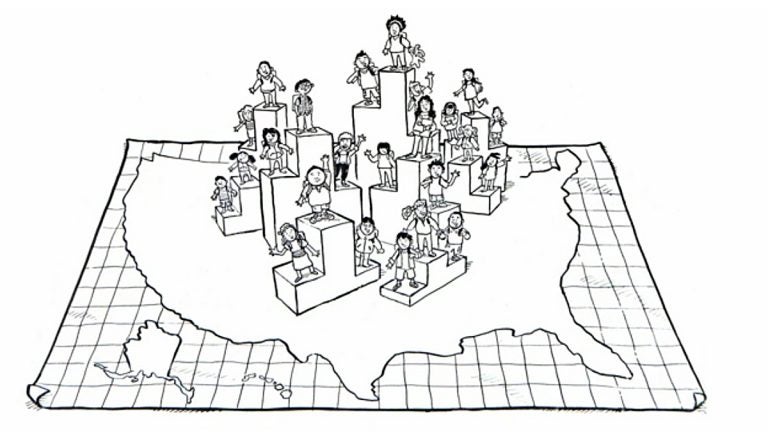Common Core: What it is, what it isn’t and why it’s political

Common Core is designed to eliminate the varying standards from state-to-state. (Image from CCSS video)
What a week for adversaries of the Common Core State Standards (CCSS)! On Wednesday Glenn Beck, famous radio and TV personality, hosted “a live national night of action against the Common Core” called WE WILL NOT CONFORM and told Fox News’ Sean Hannity that the Common Core was “creating millions of slaves.”
Not to be outmatched, this Monday the Badass Teachers Association, a radical segment of the national teacher unions, will hold a rally in Washington, D.C. to “end all federal support for the Common Core.”
Common Core-haters unite! From union queen Diane Ravitch to the racist John Birch Society, from Chicago Teachers Union President Karen Lewis, contemplating a run against Chicago Mayor Rahm Emmanuel, to anti-feminist Phyllis Schlafy, founder of the Eagle Forum, the Common Core is everyone’s favorite whipping-boy.
Maybe it’s time to step back a bit and review the Common Core, especially in light of the recent Fairleigh Dickinson poll that found that a sizable portion of New Jerseyans “know nothing” about it.
For many years America has been kicking around the idea of a nationalized set of learning objectives. In 1983, for example, a famous report called “A Nation at Risk” warned that the educational foundation of America is “presently being eroded by a rising tide of mediocrity that threatens our very future as a Nation and a people” and concluded that all students would benefit from a more rigorous set of course standards.
Albert Shanker, founder of the American Federation of Teachers, embraced the necessity of national educational standards around the same time. Shanker explained that this enterprise would be “egalitarian” because “by starting early and by giving all children the same core knowledge to learn, we can prevent the creation of an educational underclass.”
In other words, the Common Core was engendered over 30 years ago in order to promote equity and increase student learning.
But political interests seem to seep into all efforts at reform, whether the cause is universal health care or gun control or same-sex marriage. For example, just this week Louisiana Governor and presidential hopeful Bobby Jindal reversed his previous support of the Common Core in order to kowtow to GOP conservatives and issued Executive Orders to thwart implementation. (Parent and teacher groups sued him yesterday.)
So, in the interest of dispelling some politically-motivated mythology and distortions, here’s a list of what the CCSS is not:
The CSSS is not a federal mandate. It was developed by the National Governors Association and the Council of Chief State School Officers, in consultation with scholars and teacher union representatives. Nonetheless, there’s a perception that CCSS is a federal mandate because the Obama Administration required state adoption of CCSS as a prerequisite to compete in the Race to the Top, a federal education reform grant program.
The CCSS is not a rigidly-structured curriculum, but a general set of learning goals for children in kindergarten through twelfth grade. American schools have long been criticized for exposing children to great amounts of material with little opportunity for the development of meaningful understanding and critical thinking skills: some wags call our old course standards ten miles wide and one inch deep. In contrast, the CCSS emphasizes depth, not breadth.
The CCSS does not tell teachers how to teach. From the CCSS website:
“Teachers know best about what works in the classroom. That is why these standards establish what students need to learn but do not dictate how teachers should teach. Instead, schools and teachers will decide how best to help students reach the standards.”
In fact, New Jersey school teachers have been following common standards for a long time. We’ve called them Core Curriculum Content Standards – CCCS, not CCSS – and I can’t recall any rallies or “nights of action” or accusations of enslavement to protest governmental intrusion through “top down” conspiracies.
For example, the 2004 NJ CCCS for third-grade reading comprehension advises teachers to focus on these learning goals:
1. Recognize purpose of the text.
2. Distinguish cause/effect, fact/opinion, and main idea/supporting details in interpreting texts.
3. Interpret information in graphs, charts, and diagrams.
4. Ask how, why, and what-if questions in interpreting nonfiction texts.
5. Recognize how authors use humor, sarcasm, and imagery to extend meaning.
6. Discuss underlying theme or message in interpreting fiction.
7. Summarize major points from fiction and nonfiction texts.
The new Common Core, which NJ has already adopted, lists these reading comprehension skills for third-graders:
1. Ask and answer questions to demonstrate understanding of a text, referring explicitly to the text as the basis for the answers.
2. Determine the main idea of a text; recount the key details and explain how they support the main idea.
3. Describe the relationship between a series of historical events, scientific ideas or concepts, or steps in technical procedures in a text, using language that pertains to time, sequence, and cause/effect.
N.J.’s 2004 version (an updated 2008 set of goals is closer to CCSS) is actually more prescriptive than the Common Core, which focuses more on critical thinking skills and synthesis. What’s not to like?
Plenty, according to Common Core critics. But that’s mostly a result of conflating standards with student assessment tools like standardized tests. Now we’re talking politics. Let’s unpack that next week.___________________________________
Laura Waters is president of the Lawrence Township School Board in Mercer County. She also writes about New Jersey’s public education on her blog NJ Left Behind. Follow her on Twitter @NJLeftbehind.
WHYY is your source for fact-based, in-depth journalism and information. As a nonprofit organization, we rely on financial support from readers like you. Please give today.





